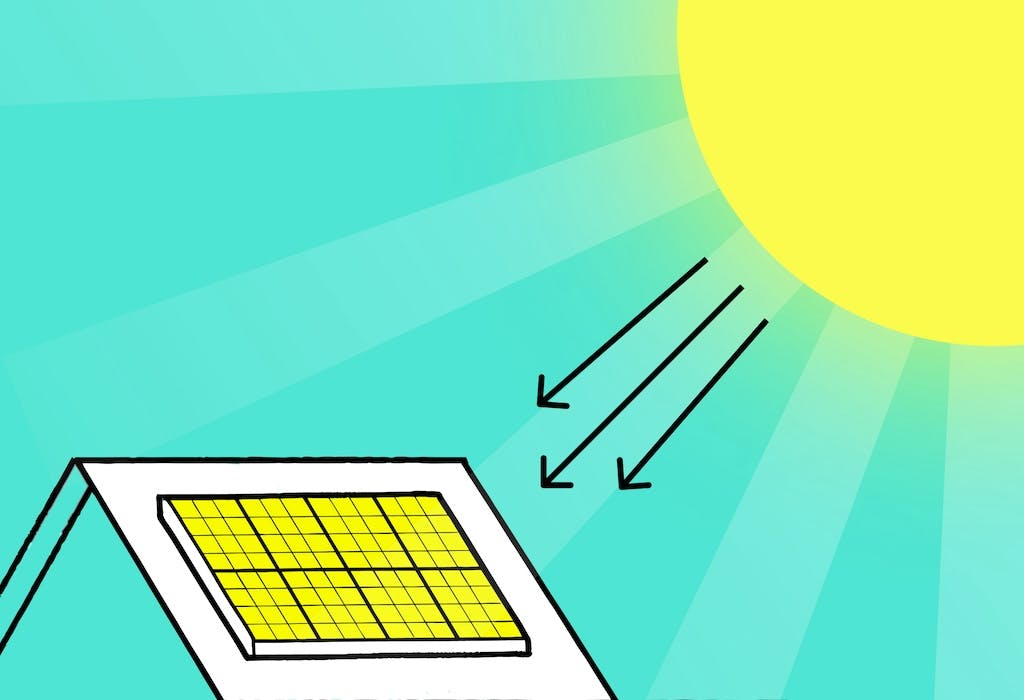- Solar advice hub
- Installation
- Ground-mounted solar panels: are they worth it?
Ground-mounted solar panels: are they worth it?
If you're considering ground-mounted solar panels, it's worth knowing if they're suitable. We dig into the details here.


Why you can trust our content
We know that the solar industry is full of misinformation, but we only use reliable sources, including:
- Our experienced solar experts, installers and system designers
- Our own database of solar & battery system designs
- Authoritative bodies like MCS and the UK government




At a glance
Ground-mounted solar panels can be a great option for certain properties, but they aren’t usually the number one choice for residential homes in the UK.
For most homeowners, rooftop solar panels with a battery system offer a more efficient and cost-effective solution. In this article, we'll go into the details and explain why.
Curious about how much you could save with a solar & battery system? Answer a few quick questions below and we’ll provide an estimate.
What are ground-mounted solar panels?
It's all in the name: ground-mounted solar panels are photovoltaic (PV) systems installed on the ground rather than on rooftops. Typically, these panels are mounted on frames or poles, tilted at an angle (usually around 35-40 degrees), and made to face south.
Ground-mounted panels are great for residential properties with lots of space, but are more typically found in commercial applications such as solar farms.
If your rooftop is not suitable for solar then a ground-mounted system could be a viable alternative, however you’ll need a lot of space and a lot of money.
How much do ground-mounted solar panels cost?
Ground-mounted solar panel installations are typically 15-20% more expensive than roof-mounted systems, because of the extra materials, labour, and groundwork required (more on that later).
According to Spirit Energy, a 10 kilowatt-peak (kWp) system costs around £27,000, a 20kWp system costs around £40,000, and a 30kWp system can set you back by an eye-watering £51,000.
For comparison, check out our guide to the cost of roof-mounted solar panels.
Ground-mounted vs roof-mounted solar panels
In the UK, it's generally smarter and cheaper to go with roof-mounted solar panel systems instead of ground-mounted. They take up less space, cost a lot less to install, and don't require as much paperwork.
Let's take a closer look at the various reasons why rooftop solar panels are the better choice for most households.

Planning permission
In the case of rooftop solar panels, you rarely have to worry about needing planning permission. Unless you live in a conservation area or in a listed building, a rooftop solar installation is usually classed as a permitted development, meaning there’s no red tape in the way.
In contrast, ground-mounted solar panel systems will nearly always need planning permission. For instance, if they exceed nine square metres then they need formal approval, and any ground-mounted system worth having will almost always exceed this size.
Plus, if the system is more than three metres wide or deep at any point, or if it’s over four metres high, then it will also require planning permission.
The hefty amount of paperwork involved can complicate and delay the installation process, which isn't great for those looking for a quick switch to solar. Plus, there's always the risk that your application may be rejected.
Cost
As mentioned earlier, ground-mounted PV installations are generally 15-20% more expensive than their roof-mounted counterparts - due to several factors.
First, there's the need for extra materials, like larger mounting equipment and support structures, to secure the panels in place. Then, the process of installing the system involves significant manual labour, including site preparation, possibly some landscaping work, and the digging of trenches to connect the system to the property's electrical infrastructure.
These extra steps increase the installation time and so lead to higher labour costs, and you’ll also be covering the price of the extra equipment.
And if your installer has offered to do the planning application for you, this will be added onto the total cost as well.
Space & shading
It makes sense to put solar panels on your rooftop, since it's otherwise just wasted space. On the flip side, the space in your garden that would be used for panels can have multiple other uses, such as recreation or gardening.
When it comes to shading, roof-mounted systems typically face fewer issues because they’re much higher up, whereas ground-mounted systems are more susceptible to shading from trees, buildings, and other obstacles - even your own property.
And lastly, ground-mounted PV setups need significantly more room to keep the panels from casting shade on each other, just like solar panels on flat roofs - which means sacrificing even more of that valuable garden space.
Annual electricity usage
Ground-mounted solar panels rarely make financial sense for residential properties unless a household’s annual electricity usage is extremely high and the system is sufficiently large. According to Spirit Energy, this threshold is typically around 10,000 kilowatt hours (kWh) of annual electricity usage and at least 10kWp of installed capacity.
And considering that the average annual electricity usage for a UK household is only 3,400kWh, it’s pretty rare to find a property that could financially justify a whole ground-mounted system.
For most properties, ground-mounted solar is just not worth the astronomical upfront cost.
Cleaning & maintenance
Although the easy accessibility of ground-mounted solar panels makes maintenance much simpler, this isn’t actually a significant benefit.
Firstly, in the case of cleaning: solar panels have a waterproof coating that makes them 'self-cleaning' whenever it rains. This means you typically only need to give your panels a proper clean every two or three years.
And despite rooftop solar panels being out of reach, it’s pretty easy to clean them with a telescopic pole (which can easily be bought online), or you can pay professionals to do it very cheaply.
In terms of solar maintenance, it’s very rarely the panels themselves that need any attention. The main concerns are the inverter and battery, both of which usually need replacing after 10-12 years, and these will almost always be located in your garage, outside, or in your loft, regardless of where your panels are installed.
To learn more, check out our guide to how long solar batteries last.
How are ground-mounted solar panels installed?
The installation process for ground-mounted solar panels involves several key steps:
- Professionals survey the site to find the perfect spot for the panels with maximum sun and minimal shade.
- The chosen area must be levelled and cleared of obstructions, so that it's properly prepared for installation. That may involve some grading or excavation to make sure the surface is flat, stable and suitable for trenching.
- Once the site is prepared, the installation team will mark out the area, dig a trench for the wiring that connects to the property, and install the mounting frames. These frames are typically anchored deep into the ground using a concrete base and/or a pole.
- The solar panels are then securely attached to the mounting frames at the optimum angle and orientation for electricity production.
- Finally, the installer connects the electrical wiring to link the panels with an inverter that converts DC electricity into usable AC electricity for the property.
Once everything is connected, the installer will run tests to make sure the system is functioning correctly and safely - and then it's ready to go.
For comparison, check out our guide to how rooftop solar panels are installed.
Are ground-mounted solar panels worth it?
Ground-mounted solar panels aren't worth it for the average UK household, as the typical annual electricity usage is far too low to justify the investment.
Roof-mounted systems are much more practical, since they're vastly cheaper to install and in most cases you don't need planning permission.
If you have a large property with enormous electricity consumption and extensive land, a ground-mounted system could be a good choice for you, but for most homeowners a roof-mounted system is the best way to switch to solar.
Want to see how much you could potentially save with a solar & battery system? Answer a few quick questions below and we’ll provide an estimate.
Ground-mounted solar panels: FAQs
Related articles

How are solar panels installed?
Read full story
The best angle and direction for solar panels in the UK
Read full story
Is my roof suitable for solar panels?
Read full story
Solar panels on flat roofs: explored
Read full story
Written byMelody Abeni
Based in London, Melody is a specialist green technology writer who has been covering sustainability, climate action and ESG for the past five years, after gathering operational experience in green investing and financial services. She has written for various industry publications, including renewable technology advisor The Eco Experts, and she holds a Master’s degree in law from Birkbeck University.